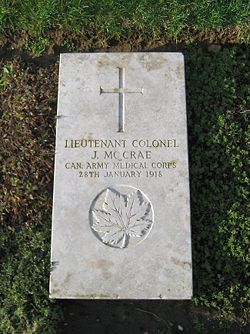
I am sure most of you have seen red poppies worn and decorating places, especially at war memorials and at times when we remember our heroes who fought and died protecting their countries during war.
The red poppy is known to be a symbol of remembrance, but I am sure most of us would like to know how it really became a symbol of remembrance.
Colonel John McCrae, who was a Professor of Medicine at McGill University first described the Flanders� poppy as the flower of remembrance. Though he was a doctor, he was a gunner in the Boer war. Soon afterwards he went to France in World War I as a medical officer with the first Canadian contingent.
As a surgeon attached to the first Field Artillery Brigade, John McCrae had spent seventeen days treating injured men in the Ypres salient. It was almost impossible to get used to the suffering, the screams and the blood, and Major McCrae had seen and heard at his dressing station enough for him to last a lifetime.
Major McCrae later wrote of his experience�
"I wish I could embody on paper some of the varied sensations of that seventeen days .... Seventeen days of Hades! At the end of the first day if anyone had told us we had to spend seventeen days there, we would have folded our hands and said it could not have been done"
A young friend and former student of Major McCrae, Lt Alexis Helmer of Ottawa, had been killed by a shell burst on 2nd May. Helmer�s death particularly affected Major McCrae. Lt Helmer was buried later that day in the little cemetery outside McCrae�s dressing station, and in the absence of the chaplain, McCrae had performed the funeral ceremony.
Sitting on the back of an ambulance on the next day, McCrae started to compose a poem with sentiments of his pain and anguish. In 1915, at the second battle of Ypres, he wrote in pencil on a page from his dispatch book a poem that has come to be known as �In Flanders Fields� which describes the poppies that marked the graves of soldiers killed fighting for their country. McCrae could see the wild poppies that sprang up in the ditches and he spent twenty minutes of precious rest time scribbling lines in a notebook.
Cyril Allinson, who was a young twenty two year old sergeant major at that time, watched McCrae write it. Allinson was delivering mail that day when he saw McCrae. The major looked up as Allinson approached, then went on writing while the sergeant major stood there quietly. Allinson recalled �His face was very tired but calm as he wrote�. �He looked around from time to time, his eyes straying to Helmer�s grave.� When he finished five minutes later, he took his mail from Allinson and without saying a word, handed his pad to the young soldier. Allinson was moved by what he read.
Dissatisfied with it, McCrae tossed the poem away, but a fellow officer retrieved it and sent to the newspapers in England. �The Spectator� in London rejected it, but �Punch� published it on 8th December 1915.
To this day McCrae�s �In Flanders Fields� remains one of the most memorable war poems ever written, with its lasting legacy of the terrible battle in the Ypres salient.
In Flanders Fields
In Flanders fields the poppies blow
Between the crosses, row by row,
That mark our place; and in the sky
The larks, still bravely singing, fly
Scarce heard among the guns below.
We are the dead.Short days ago
We lived, felt dawn, saw sunset glow,
Loved, and were loved, and now we lie
In Flanders fields.
Take up our quarrel with the foe;
To you from failing hands we throw
The torch; be yours to hold it high.
If yea break faith with us who die
We shall not sleep, though poppies grow
In Flanders fields.
McCrae was a chronic asthmatic, and his lungs had been badly damaged by the chlorine gas at Ypres.
On 25 January 1918, he fell ill with pneumonia, and in three days he was dead.
Each Remembrance day the British Legion lays a wreath on his grave as a tribute to a great man whose thoughts were always for others.








